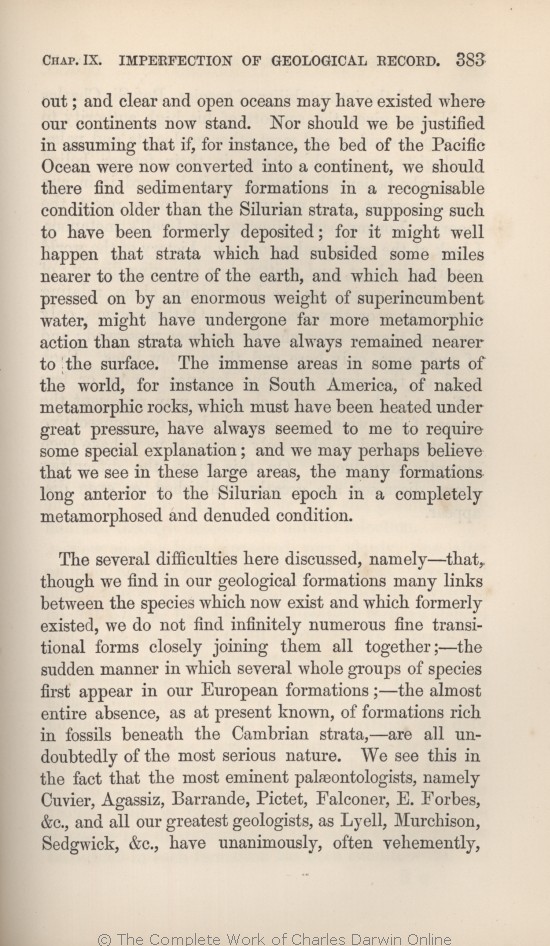out; and clear and open oceans may have existed where our continents now stand. Nor should we be justified in assuming that if, for instance, the bed of the Pacific Ocean were now converted into a continent, we should there find
sedimentary formations in a recognisable condition | sedimentary formations in a recognisable condition 1866 1869 1872 |
| formations 1859 1860 1861 |
| Silurian 1861 1866 1869 | | silurian 1859 1860 | | Cambrian 1872 |
| naked 1866 1869 1872 | | bare 1859 1860 1861 |
| Silurian 1861 1866 1869 | | silurian 1859 1860 | | Cambrian 1872 |
| and denuded condition. 1869 1872 |
| condition. 1859 1860 |
| but likewise denuded condition. 1861 1866 |
|
The several difficulties here discussed,
namely— that, though we find in our geological formations many | namely— that, though we find in our geological formations many 1866 1869 1872 |
| namely our not finding in the successive formations infinitely numerous transitional 1859 1860 |
| namely— that though we find in our geological formations many 1861 |
| ..... 1861 1866 1869 1872 | | many 1859 1860 |
| and which formerly existed, we do not find infinitely numerous fine transitional forms closely joining them all together;— 1869 1872 |
| or have existed; 1859 1860 |
| and have existed, 1861 1866 |
| the 1859 1860 1869 1872 |
| we do not find infinitely numerous fine transitional forms closely joining them all together;— the 1861 1866 |
| several whole 1861 1866 1869 | | whole 1859 1860 | | several 1872 |
| first appear 1869 1872 | | appear 1859 1860 | | first appeared 1861 1866 |
| formations;— 1861 1866 1869 1872 | | formations; 1859 1860 |
| ..... 1866 1869 1872 | | fossiliferous 1859 1860 1861 |
| rich in fossils beneath the Cambrian strata,— 1869 1872 |
| beneath the Silurian strata, 1859 1860 |
| beneath the Silurian strata,— 1861 |
| rich in fossils beneath the Silurian strata,— 1866 |
| most serious 1861 1866 1869 1872 | | gravest 1859 1860 |
| OMIT 1861 1866 1869 1872 |
| plainest manner by the 1859 1860 |
| ..... 1861 1866 1869 1872 | | all 1859 1860 |
| namely 1859 1860 1861 1866 1869 | | namely, 1872 |
| ..... 1860 1861 1866 1869 1872 | | Owen, 1859 |
| Pictet, Falconer, 1861 1866 1869 1872 | | Falconer, 1859 1860 |
| &c., 1859 1860 1866 1869 1872 | | &c, 1861 |
|









